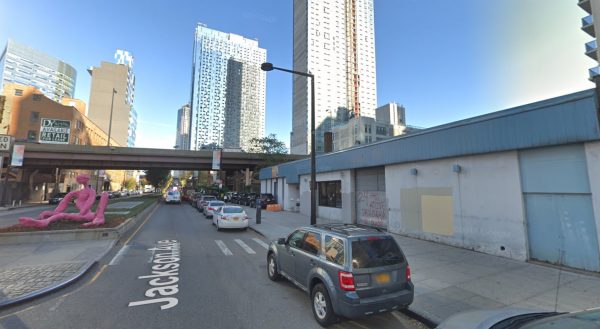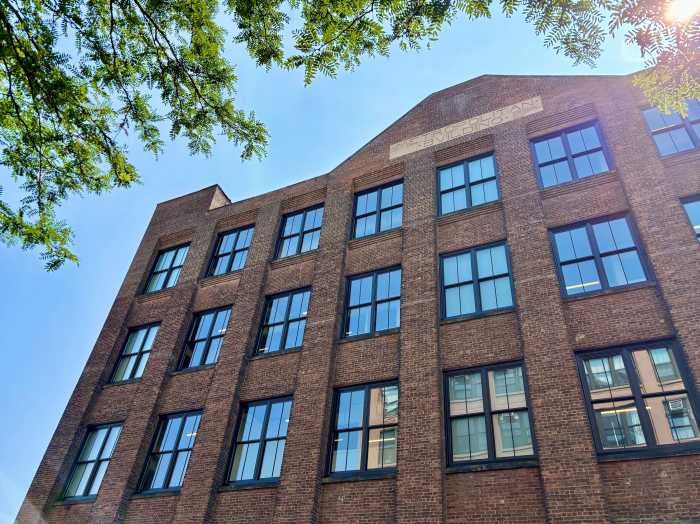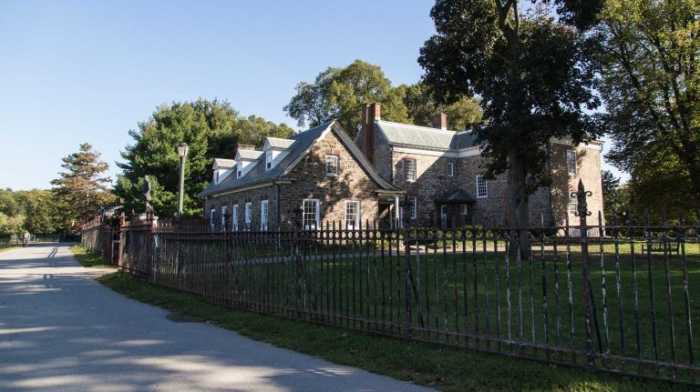27-01 Jackson Ave., one of two sites owned by the Lions Group. (Google Maps)
June 8, 2018 By Nathaly Pesantez
The city’s proposed transfer of its air rights to a private developer in exchange for some affordable units within a two-tower project in Long Island City was rejected by Community Board 2 last night.
The plan to transfer thousands of square feet of air rights to American Lions, a joint venture by the Lions Group and Fetner Properties, was voted down by the board by 33 votes to one.
The proposal, currently undergoing a lengthy public review process before reaching City Hall, centers on adding affordable units to the city’s housing supply. The air rights in question come from the unbuildable space under the Queensboro Bridge approach ramps going across Jackson Avenue.
Under the deal, the developers would be able to build 27 and 49 story towers with a mix of rentals and condos at 27-01 and 26-31 Jackson Ave., respectively—roughly double and triple the size currently permitted there.
Of the roughly 360,000 square feet of transferred development rights, 40 percent of it would be used by the developers for affordable rentals, resulting in a total of 150 affordable units in a 481-apartment project.

26-32 Jackson Ave., one of two lots slated for development. (Google Maps)
In addition, the affordable units would be priced at 130 percent of the Area Median Income, requiring a family of three to have an income of $104,606 to qualify.
The board, like many in the public who spoke out against the project, panned the proposal, believing it to be an assault on a neighborhood overwrought with development, not affordable enough, and a free giveaway of public assets with no gain.
“We understand affordability according to the English language definition,” said Pat O’Brien, criticizing the list of qualifying incomes for the project defined by law. He said that the qualifying incomes are too high for Community Board 2 residents.
Sheila Lewandowski, another board member, worried that the project would spur more air rights transfers from other un-buildable lots around the city to private developers.
“I’m terrified of this project because it sets a terrible precedent,” she said.
The developers, along with Department of Housing Preservation and Development, the agency behind the project, insisted that the deal enables the creation of many affordable units in buildings that would otherwise not have them.
“They took something that was really nothing—land under a bridge—and created 150 workforce housing homes,” said Damon Pazzaglini, chief operating officer of Fetner Properties.
A number of members from local civic groups urged the board to vote no on the deal.
“It is unconscionable to increase the mass of these buildings threefold without a larger benefit to our community,” said Rebecca Barnes, vice president of the Court Square Civic Association.
Brent O’Leary, president of the Hunters Point Civic Association, said the neighborhood is “in crisis”, adding that Long Island City isn’t necessarily anti-development.
“If you come here and you put a burden in our neighborhood, you’re gonna have to help us with that burden,” he said.
In a statement, the HPD said the project is still in its early stages of the public review process. “Community engagement is a valued and critical component to the work we do at HPD…and we look forward to continuing our work with our partners in the community going forward,” a spokesperson said.
The Lions Group, in addition, said it “listened carefully” to the board’s concerns and intends to address them to the best of its ability.
The project’s next stop in the public review process is the Queens Borough President’s office, before eventually reaching the City Council and mayor.


































